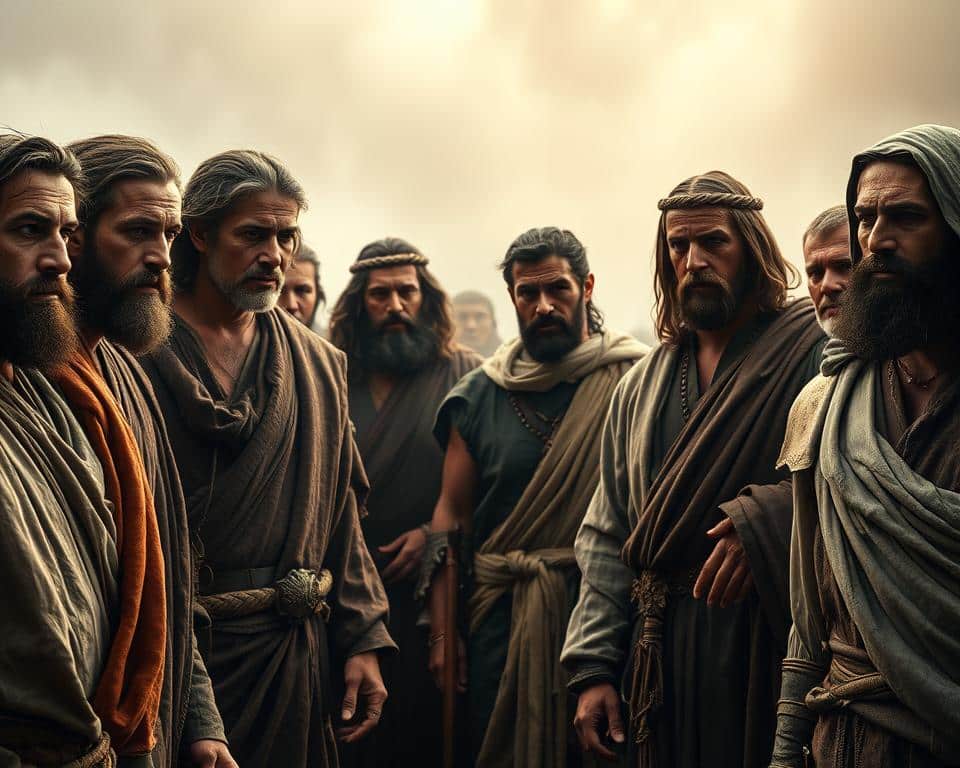Have you ever wondered why the Bible includes stories of people who failed? These figures, like Noah, Moses, and Saul, are celebrated for their faith. Yet, they also faced personal struggles and made mistakes. Their lives show us that even the most devoted individuals are not perfect.
The Bible doesn’t hide their flaws. Instead, it presents honest accounts of their challenges. These stories remind us that everyone faces issues, no matter how strong their faith. By learning from their lives, we can find hope and grace in our own journeys.
This article explores the lives of these figures. You’ll see how their mistakes shaped their stories. More importantly, you’ll discover how the Lord used them despite their imperfections. Let’s dive into these lessons and reflect on how they apply to us today.
The Story Behind Biblical Heroes
What makes the stories of these figures so relatable? They were not perfect. They faced doubts, fears, and failures just like us. Their lives remind us that faith doesn’t erase struggles but helps us navigate them.

Understanding Their Human Nature
These figures were real people with real challenges. Moses doubted his ability to lead. David made grave mistakes. Yet, God used them to fulfill His plans. Their stories show that imperfection doesn’t disqualify you from being used by Him.
Consider Romans 3:23-24: “For all have sinned and fall short of the glory of God, and all are justified freely by His grace.” This truth applies to everyone, including these leaders. Their lives are a testament to God’s grace.
Embracing Imperfection with Faith
Their flaws were not hidden. Instead, they were highlighted to teach us valuable lessons. David’s repentance, Moses’ humility, and Peter’s restoration show that faith grows through failure. These examples encourage us to trust God even in our weakest moments.
Their lives were not just about their mistakes. They were part of a greater act in God’s plan. By embracing their imperfections, we can find hope and strength in our own journeys.
Biblical heroes and their flaws
Why do the Scriptures highlight the imperfections of its key figures? These stories are not just about their triumphs but also their struggles. They remind us that faith is not about perfection but about perseverance.
Defining Character and Shortcomings
What makes these figures relatable is their humanity. Adam, the first man, fell to temptation. Moses, chosen to lead, doubted his abilities. These flaws show that even the most devoted individuals faced challenges.
Hebrews 11 lists many of these leaders, celebrating their faith while acknowledging their failures. Their stories teach us that imperfection does not disqualify you from God’s plan. Instead, it highlights His grace and mercy.

The Impact of Their Mistakes
Their mistakes had lasting consequences. Moses’ anger kept him from the Promised Land. David’s sins brought turmoil to his family. Yet, these failures were part of their journey toward redemption.
John’s gospel reminds us that even those closest to Jesus had flaws. Peter denied Him, yet he became a cornerstone of the early church. These examples show that faith grows through failure.
Understanding their imperfections helps us see the bigger picture. Their lives were not just about their mistakes but about how God used them despite their flaws. This truth encourages us to trust Him in our own struggles.
Profiles of Iconic Heroes
What can we learn from the lives of those who walked closely with God yet stumbled along the way? These figures, though celebrated for their faith, were not without their faults. Their stories remind us that even the most devoted individuals face challenges and make mistakes. Let’s explore the lives of Noah, Moses, and Saul to see how their strengths and failures shaped their journeys.
Noah – A Legacy of Faith and Fault
Noah is remembered for his unwavering faith in God. He obeyed the Lord’s command to build an ark, saving his family and countless animals from the flood. Yet, after the flood, Noah’s story takes a surprising turn. Genesis 9:20-21 recounts his drunken episode, a moment of weakness that reminds us of his humanity.
Despite this mistake, Noah’s faith remains a powerful example. His life shows that even those who walk closely with God can falter. Yet, God’s grace continues to work through imperfect people.
Moses – Leadership Amid Personal Struggles
Moses was chosen to lead the Israelites out of Egypt, a monumental task. Yet, he often doubted his abilities. In Exodus 4:10, Moses tells God, “I am not eloquent… I am slow of speech and tongue.” Despite his insecurities, God used him to perform miracles and guide His people.
Moses also struggled with anger. In Numbers 20:11-12, his frustration led him to strike a rock instead of speaking to it as God commanded. This act kept him from entering the Promised Land. Moses’ life teaches us that even great leaders face personal struggles.
Saul – From Persecution to Redemption
Saul, later known as Paul, began as a persecutor of Christians. He was present at the stoning of Stephen, the first Christian martyr (Acts 7:57-8:1). Yet, his life took a dramatic turn when he encountered Jesus on the road to Damascus (Acts 9:1-19).
After his conversion, Saul became a passionate advocate for the Gospel. He described himself as the “worst of sinners” in 1 Timothy 1:15-16, highlighting God’s grace. Saul’s transformation shows that no one is beyond redemption.
Lessons Learned from Imperfections
What can we take away from the imperfections of those who walked in faith? Their stories remind us that growth often comes through struggle. By reflecting on their lives, we can find practical lessons for our own journeys.
Realizing the Value of Honest Reflection
Acknowledging flaws is the first step toward growth. Every man faces shortcomings, and this is part of God’s plan. Moses, for example, doubted his ability to lead, yet God used him to deliver His people. His story teaches us that honest reflection leads to transformation.
Paul, once a persecutor of Christians, later wrote, “I am the worst of sinners.” His self-awareness allowed him to embrace God’s grace. This truth applies to us today. When we confront our mistakes, we open the door to redemption.
How Mistakes Shape Growth
Mistakes are not the end of the story. They are opportunities for growth. Moses’ anger kept him from the Promised Land, but his journey shows the importance of personal introspection over time.
“For all have sinned and fall short of the glory of God, and all are justified freely by His grace.” (Romans 3:23-24)
Biblical fathers like David learned from their errors. His repentance after his sin with Bathsheba highlights the role of love and proper judgment in overcoming past mistakes. These examples encourage us to reflect honestly on our own lives.
Navigating mistakes can be transformative. Personal growth comes with accepting both failure and the redeeming truth. Let these lessons inspire you to model honest reflection in your everyday choices.
Exploring Examples Across Testaments
How do the Old and New Testaments reveal God’s work through flawed individuals? The Scriptures show a continuous thread of transformation, from the early days of Genesis to the redemptive stories in Acts. These narratives remind us that God’s plan is unchanging, even as His people grow and change.
Old Testament Figures and Their Journeys
In the Old Testament, we see figures like Moses and David, who faced immense challenges. Moses doubted his ability to lead, yet God used him to deliver His people. David, a man after God’s own heart, fell into sin but found redemption through repentance.
These stories highlight the presence of satan and sin in the world. Yet, they also show how God works through imperfect people. The Old Testament prepares us for the New Testament’s message of hope and restoration.
New Testament Transformations
The New Testament brings stories of radical change. Saul, once a persecutor of Christians, became Paul, a passionate advocate for the Gospel. His encounter with Jesus on the road to Damascus (Acts 9:1-19) marked a turning point in his life.
Paul’s transformation shows that no one is beyond God’s grace. He described himself as the “worst of sinners” (1 Timothy 1:15-16), yet God used him to spread the Gospel to the world. His story is a bridge between the Old and New Testaments, showing continuity in God’s plan.
These examples remind us that transformation is possible, no matter our past. They also encourage us to apply these lessons to our lives today. By studying both Testaments, we see a complete picture of God’s redeeming work.
The Role of Redemption in Flawed Lives
Have you considered how God uses imperfect lives to reveal His grace? The Scriptures are filled with stories of individuals who made mistakes yet found redemption. These narratives remind us that no one is beyond God’s reach, and every life holds value in His eyes.
God’s Use of Brokenness
Even the greatest figures in Scripture faced moments of brokenness. Take King David, for example. He was a man after God’s own heart, yet he fell into deep sin. His story shows that God’s grace is greater than our failures. Despite his mistakes, David repented and was restored.
David’s life teaches us that brokenness is not the end. It’s an opportunity for God to work. Romans 8:28 reminds us, “And we know that in all things God works for the good of those who love Him.” This truth applies to every life, no matter how flawed.
Grace in Everyday Choices
Redemption isn’t just for the big moments; it’s for everyday choices too. Think about how small decisions can lead to significant change. When we acknowledge our sin and turn to God, He transforms our lives.
Consider the story of Rahab, an old testament figure who made a courageous choice to trust God. Her faith led to her redemption and a place in the lineage of Jesus. Her story shows that no one is too far gone for God’s grace.
“If we confess our sins, He is faithful and just and will forgive us our sins and purify us from all unrighteousness.” (1 John 1:9)
Everyday choices matter. Whether it’s a moment of doubt or a decision to act in faith, God can use it for His purpose. Redemption is a recurring theme in Scripture, and it’s available to you today.
Even in your lowest moments, there is hope. God’s grace can transform your mistakes into meaningful change. Reflect on these truths and let them guide your journey toward redemption.
Modern Relevance in Ancient Stories
How can ancient stories from the Bible still guide us in today’s world? These narratives, though written centuries ago, offer timeless lessons that apply to our daily lives. The church continues to use these stories to inspire hope and faith in a world filled with challenges.
Take the book of Genesis, for example. Its stories of creation, faith, and redemption provide a foundation for understanding God’s plan. They remind us that even in the face of uncertainty, His promises remain steadfast. These truths are not just historical accounts but living lessons for us today.
Applying Biblical Truths Today
The bible is more than a collection of ancient texts. It’s a guide for navigating modern challenges. For instance, the story of Joseph in Genesis teaches us about perseverance and trust in God’s timing. His journey from betrayal to leadership offers hope for anyone facing adversity.
Here are three ways to apply these truths today:
- Trust in God’s plan, even when circumstances seem uncertain.
- Find strength in faith during difficult times.
- Use biblical principles to make wise decisions.
Finding Hope in Real-Life Challenges
Life today is filled with challenges, from personal struggles to global crises. Yet, the bible reminds us that hope is always within reach. The story of Noah, for example, shows how faith can lead to deliverance even in the most dire situations.
“For I know the plans I have for you, declares the Lord, plans to prosper you and not to harm you, plans to give you hope and a future.” (Jeremiah 29:11)
These ancient stories are not just relics of the past. They are sources of encouragement and guidance for our lives today. By applying their lessons, we can find hope and strength to overcome any thing we face.
Final Reflections on Flaws and Faith
What can we learn from the lives of those who walked closely with God yet stumbled along the way? Their stories remind us that faith grows through failure. Even in the Old Testament, figures like Moses and David show that imperfection leads to redemption. Their journeys speak to the heart, offering hope for us today.
Paul’s transformation is a powerful testimony. Once a persecutor, he became a passionate advocate for the Gospel. His life shows that no one is beyond God’s grace. The Gospel of Matthew underscores this truth, reminding us that real faith develops through honest reflection.
These stories encourage us to embrace our imperfections. They remind us that God’s love is greater than our mistakes. Let these reflections inspire you to grow in faith and trust in His plan for your life.





